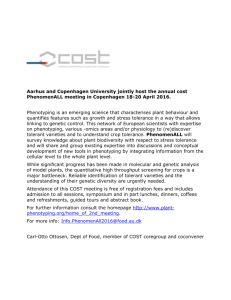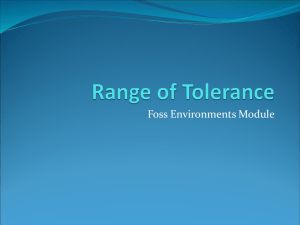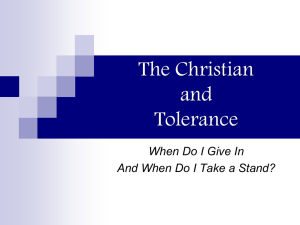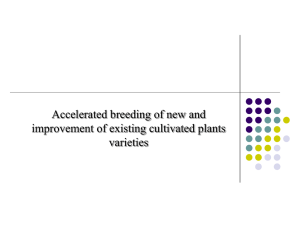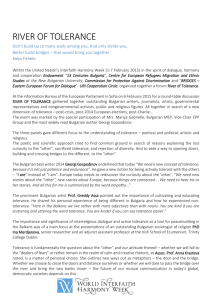Grounds of Liberal Tolerance
advertisement
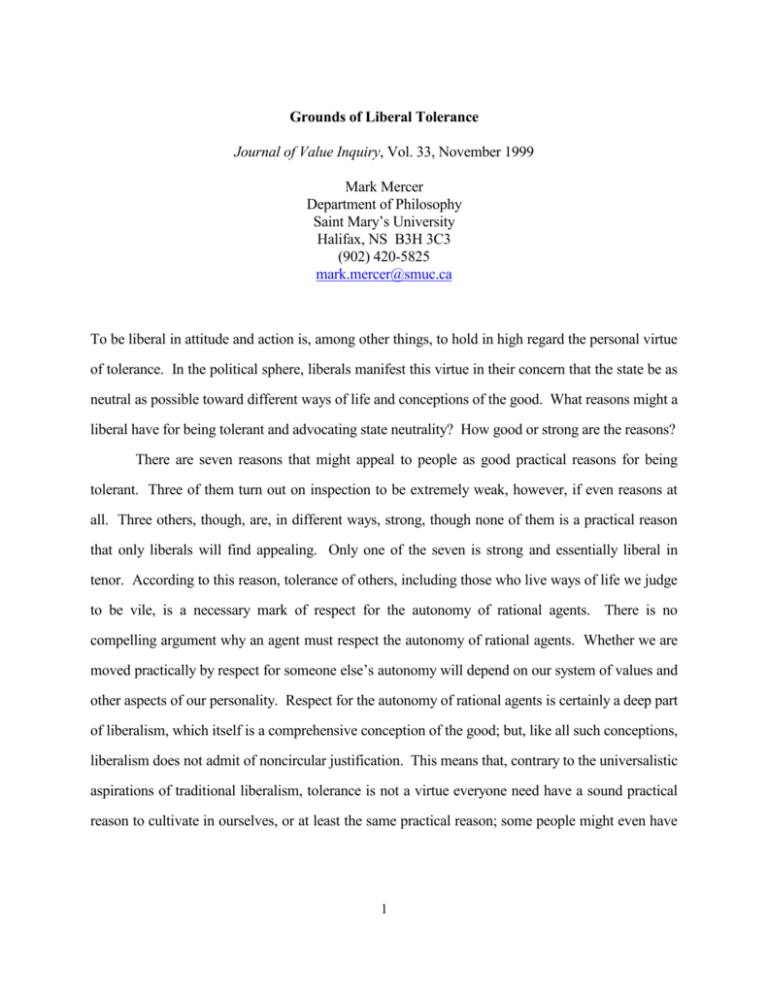
Grounds of Liberal Tolerance Journal of Value Inquiry, Vol. 33, November 1999 Mark Mercer Department of Philosophy Saint Mary’s University Halifax, NS B3H 3C3 (902) 420-5825 mark.mercer@smuc.ca To be liberal in attitude and action is, among other things, to hold in high regard the personal virtue of tolerance. In the political sphere, liberals manifest this virtue in their concern that the state be as neutral as possible toward different ways of life and conceptions of the good. What reasons might a liberal have for being tolerant and advocating state neutrality? How good or strong are the reasons? There are seven reasons that might appeal to people as good practical reasons for being tolerant. Three of them turn out on inspection to be extremely weak, however, if even reasons at all. Three others, though, are, in different ways, strong, though none of them is a practical reason that only liberals will find appealing. Only one of the seven is strong and essentially liberal in tenor. According to this reason, tolerance of others, including those who live ways of life we judge to be vile, is a necessary mark of respect for the autonomy of rational agents. There is no compelling argument why an agent must respect the autonomy of rational agents. Whether we are moved practically by respect for someone else’s autonomy will depend on our system of values and other aspects of our personality. Respect for the autonomy of rational agents is certainly a deep part of liberalism, which itself is a comprehensive conception of the good; but, like all such conceptions, liberalism does not admit of noncircular justification. This means that, contrary to the universalistic aspirations of traditional liberalism, tolerance is not a virtue everyone need have a sound practical reason to cultivate in ourselves, or at least the same practical reason; some people might even have 1 excellent reason to be generally intolerant in attitude and action. Nonetheless, those of us who are liberals and respect the autonomy of rational agents are obliged to cultivate the virtue of tolerance. We will take up two tasks. The first is to evaluate each of the seven practical reasons for being tolerant, and, moreover, specifically to evaluate them from a liberal point of view. The second is to explain why it is important, at least for liberals, to cultivate tolerance for the right practical reason: in virtue of its connection to respect for autonomy. Failing to value tolerance for this particular practical reason can lead to one or both of two consequences. The exercise of tolerance can cause us to become indifferent to our own central values and goals, and indifferent to the cruelty and injustice of others, and this can lead us into a malaise of the spirit. Alternatively, failing to value tolerance for the right reason can have the effect of weakening our commitment to tolerate others, and thereby encourage us to retreat into intolerance as soon as the going gets tough, rather than to expend the energy and pay the price being tolerant often requires. To value tolerance for the right reason, however, has neither of these effects. It leads neither to indifference nor to an easy willingness to abandon toleration. At the same time, though, we might worry that valuing tolerance as a mark of respect for persons will have a deleterious effect precisely opposite to that of being ready to give up tolerance too easily. We might think that being tolerant for this reason can have the effect of making an individual too tolerant, unable to see that some situations of grave injustice or cruelty, for instance, require active intolerance. I The tolerance liberals speak of is not to be confused with either the warm acceptance of others and their ways or mere indifference towards them. Something we actually like, or simply find inoffensive and nonthreatening, is not something we tolerate. Tolerance is a virtue exercised in the face of something we find silly, offensive, noxious, vile, disturbing, disgusting, or unworthy. It is a virtue especially when it is exercised in the face of something we find threatening to our own way 2 of life. It is a mistake, then, to say of liberals that they are tolerant of, for instance, their neighbours and fellow citizens who belong to racial or ethnic groups different from their own; it is a mistake because liberals welcome racial and ethnic diversity in their societies, for various reasons they want to live in a society marked by such diversity. For most liberals, it is also a mistake to say that they are tolerant of homosexuality, given that most of them are simply indifferent to the sexual preferences and consensual relations of others. To tolerate something is to accept its existence even as we wish, perhaps with all our heart, that it did not exist. Racism, consumerism, meat eating, violent or degrading pornography, ugly houses, cigarette smoking, mindless or trite music, tattoos and body piercing, the teaching of creation science, the teaching of Darwinian evolution, prayer or patriotic displays at public events, the lack of prayer or patriotic displays at public events, trash novels, high literature, atheism, religious beliefsCthese are examples of the sort of thing that matter enough to people such that they can find themselves called upon to be tolerant of others and their ways. Perhaps most challenging for the liberal to tolerate are illiberal groups found within her society that restrict the freedoms of their members or deny their equality. The liberal contends that even people who choose to live ways of life or to engage in practices she thinks are stupid, empty, vile, or destructive should be free to do so, unrestrained by political or economic coercionCuntil, of course, tolerance of such ways of life or practices seriously compromises public safety or other values she holds. Tolerance, then, is a virtue at least in that exercising it often requires sacrifice or comes with a cost. It requires renouncing certain tools and strategies for effecting change in a community or society that we would, on the whole, welcome. It might come at the cost of pain and anguish when we encounter racist literature or other signs of the existence of attitudes or practices we reject; it might well also come at the cost of suffering injustice and cruelty. That the liberal renounces certain tools and strategies for effecting change in private attitudes and public practices does not, however, mean that he or she renounces every tool. This is 3 a centrally important point that distinguishes liberal tolerance from mere bloodless acceptance. The liberal is not constrained by tolerance to desist from speaking out against that which she dislikes or reviles. She can engage in public argument about the stupidity or vileness of a way of life or set of beliefs without being intolerant of it, and she can organize demonstrations and rallies against it. She might very well be eager and ready to make a case against racism, for instance, or against religion, and she does so in appropriate fora whenever she gets the chance. She is not constrained by tolerance to avoid identifying incidents of cruelty or injustice within the institutions or practices of a group, or to refrain from making members of that group aware of what they perpetuate or suffer. As well, in many cases it is not intolerant of her to provide incentives to others to change their practices. Others may have reasons of their own for seeking her assistance, and tolerance does not enjoin her to work or associate with them only on their own terms. If a club desires her as a member, she can name as a condition of her joining that it change some regulation. Finally, it is not intolerant of a person to favor with his presence and money institutions conducive to his comfort and happiness, thereby indirectly denying his presence and money to other institutions. A person can choose to shop at stores that do not carry cigarettes or pornography if he prefers not to be reminded of cigarettes or pornography, even though his doing so might eventually cause competing stores to drop cigarettes or pornography, making them more difficult for others to obtain. What a tolerant liberal will not do, however, is to seek to have criminalized the production or distribution of cigarettes, pornography or racist literature, and she will not refuse to buy products from companies that advertise on television stations featuring religious program. Her public concern is that the state not intervene to reform society through laws or other coercive policies when they abrogate or restrict freedom of thought, dress, speech, association, or assembly; she is opposed to the political and economic repression even of ways of life or practices she reviles. As a matter of personal comportment, she is civil toward people who advocate or exemplify what she reviles, even as she presents to them or others her case against their ways or ideas. 4 Of course, in practice, it is not always possible to draw a clear line between what a liberal may do to reform the practices of others while being true to her commitment to tolerance and what she may not do. Talking and demonstrating, for instance, shade into hectoring and obstructing, and it might not be clear which side some particular action falls on. As well, tolerance involves not only outward actions, but also the attitudes and intentions behind them. To refuse to shop at a store that carries cigarettes because the store carries cigarettes, is pretty much to apply economic pressure on it to change its ways, and that is to be intolerant toward people who buy cigarettes there. At the same time, to shop at a store that does not carry cigarettes because it does not carry them is simply to express a preference not to be reminded of the waste and suffering smoking causes, and thus is not to be intolerant. Each path might have the same result: the store that carries cigarettes might drop them, and that might make it more difficult for smokers to pursue their habit. That the consequences of tolerant and intolerant behavior can be the same muddies the line between the two. So also does the fact that, in practice, our reasons for our choices are often many, and we are seldom clear about the relative strength of each component reason. Let us investigate further the distinction between what the tolerant liberal thinks she may and may not do in the face of ways of life or practices she would rather not exist by looking at a particular case of state intolerance. Currently in Canada the distribution of extreme racist literature is illegal under a set of what are called hate laws. Liberals certainly are as offended as anyone by racist literature but, as hate laws restrict the freedoms of thought and speech, tolerance requires that liberals reject them. Liberals ought to seek to have such laws removed. Nonetheless, tolerance does not preclude the liberal from publicly exposing the falsehoods on which racism is typically founded, nor does it preclude her explaining to racists, and publicly exemplifying in her own life, the attractions of nonracist attitudes and ways; and tolerance of racists does not require her to refrain from organizing anti-racist groups dedicated to these projects. As well, currently in Canada, unions of homosexual couples are not recognized legally as marriages. Though a liberal might find 5 homosexual activity disgusting or think homosexual unions less conducive than heterosexual unions to the realization of important human goods, still, as a liberal she must think the failure to recognize homosexual unions as marriages a violation of state neutrality toward ways of life. Unless she has very strong grounds for thinking the state ought not be neutral in such a case, she ought to advocate, then, that either Canada recognize in law homosexual marriage or get out of the marriage business altogether. But this does not mean that she must remain silent about her reasons for thinking heterosexuality superior to homosexuality. II On what beliefs or values does liberal tolerance rest? We may begin with the three weak, practical arguments for being tolerant. The first concerns skepticism about our knowledge of values. This argument in favor of being tolerant of others begins from the premise that we cannot know that any way of life is, in any fundamental ethical sense, better than any other. For all we may know, a skeptic may say, our own way of life is, from the moral point of view, the vile one. Therefore, it seems, the only justifiable practical response to other ways of life is to tolerate them. The skeptical premise in this argument is certainly questionable. Maybe good reasons in favor of the superiority of some ways of life over others are not beyond our powers to discover. Or, maybe, as pragmatists about value maintain, the presupposition that reasons in favor of a way of life must be theoretical and binding on all agents, and not just entirely practical and applicable only to those already possessed of certain beliefs and values, should be rejected. In either case, what is most obviously wrong with this argument is that it is a non sequitur. My inability to know of any way of life that it is worse than any other would mean that I could have no more reason to express tolerance toward a way of life I disapprove of than to express intolerance. Thus, skepticism supports intolerance precisely to the degree it supports tolerance. 6 The second argument concerns a purported relativity of value. According to relativists, any way of life can be justified theoretically in its own terms, while to criticise one way of life in terms appropriate to some other way of life is to hold it answerable to an inappropriate standard. To judge some way of life inferior to our own, we would have to have attained an objective view of things that transcends all ways of life, and such a view cannot be had. Therefore, the only justifiable practical response to other ways of life is to tolerate them. The relativistic premise in this argument is questionable. Ethical realists typically hold that there are culture-independent ethical standards; if they are right, then the premise is false. Alternatively, if good reasons for rejecting a way of life can be practical without being theoretical, then, even in the absence of culture-independent ethical standards, the premise is still false. But the most obvious problem with this argument is that like the argument based on scepticism, it is a non sequitur. If ethical justification is culture or belief relative, then I am justified in being intolerant toward ways of life that I judge inferior, just so long as my judgment of their inferiority is appropriate, given my own standards, and intolerance is, in my culture or according to my beliefs, the proper practical response in light of such judgments. If, according to my own standards, some way of life offends me, then I have a reason to oppose it. If there is no higher standpoint from which my offence can be declared unwarranted or inappropriate, then my opposing it is warranted on the only grounds possible for me to recognize, my own grounds. That I cannot say the offending way of life is worse than my way of life is irrelevant, or so it seems, to what I have reason to try to do with or to people who practice it. If the absence of objective values means that I can have no reason to stand against ways of life that offend me, it means also that I can have no reason to do things that constitute living my life. Skepticism and relativism come in for much abuse at the hands of philosophers, whether or not they are realists about value. For that reason, we might think it wasted effort to bother exposing the flaws in skeptical and relativistic arguments for tolerance. But, despite what philosophers have 7 said, skepticism and relativism continue to provide the grounds of the two most popular defenses of tolerance and state neutrality found in contemporary life. That is why the fact that they fail entirely to serve as bases for tolerance needs to be insisted upon, and better justifications brought forth. People who appeal to these justifications in their social and political lives are in danger of coming to see just how bad they are; thus, they are in danger of losing their reasons to be tolerant of others. Their tolerance is a will-o’-the-wisp, if they have no better reason for it. The third argument concerns value pluralism. According to pluralists, there are many ways of life that, while differing in fundamental ways, are, from an ethical point of view, equally good ways for people to live. However, because they differ in fundamental ways, equally good lives might exclude each other and, indeed, be hostile to each other. The life of a dedicated professional musician might be one example of a potentially good life, rich with the possibility of accomplishment, reward, and satisfaction; that of a devoted father might be an example of another. Perhaps, in many cases, these two ways of life cannot be combined without each suffering. Moreover, the existence of the musician's life might threaten the realization of the goods possible in the father’s life. Still, the father can well understand that he would protect his way of life through eliminating the musician’s only at the cost of eliminating what he realizes are actual goods. The values and goals of the Portuguese of the seventeenth century and the values and goals of the Arawak might supply us with another example. Therefore, pluralists conclude, tolerance is required to prevent minority or powerless good ways of life from disappearing. This argument, closely associated with Isaiah Berlin, has, unlike the previous two, much to recommend it.1 But it might not, in the end, be a reason to be tolerant, at least as we have considered tolerance. After all, it comes into play only after we have judged ways of life we reject for ourselves nonetheless to be good ways of life. It gives us a reason to accept and perhaps cherish the existence of certain ways of life different from our own, but this is not what it is to be tolerant. Thus, it gives us no reason to tolerate those ways of life we judge less than good. However 8 persuasive an argument it is on its own terms, it serves to remind us that pluralist conceptions of value neither entail nor are entailed by tolerance. There are, however, some objections to be made to this reason for being, if not tolerant, at least accepting of different ways of life. For one, this reason can appeal only to people who accept a particular pluralistic conception of value. People who think there is but one good way to live, or who think that the concept of objectively good ways of life is empty, will not be moved by it unless acceptance of difference is already held by them to be a value. But even those who do accept the realism about value it involves might not find in this argument a practical reason to try to preserve or respect ways of life different from their own. It is certainly possible for a person to find himself with a reason to do something he realizes will jeopardize the continuing existence of a way of life he judges perfectly fine. Just as each of us in our own lives has had to choose between alternative appealing ways of life, abandoning some in favor of others without feeling a responsibility to preserve that which we have abandoned, so too that we see the goodness in the way of life of someone else need not engender in us a sense of responsibility toward it. The recognition that someone else finds his way of life satisfying and is right to do so is not itself a practical reason to consider him anything other than a rival or enemy. If the needs of people living another way of life are diverting resources from us, the fact that we think it fine that the others live as they do will not count as a reason to refrain from trying to draw those resources back to us. III Neither skepticism about our knowledge of value nor relativism gives us any reason at all to be tolerant, and pluralism about value does not give us a reason to be tolerant of ways of life we judge wrong, but, at most, a reason to accept ways of life we judge good, and maybe not even that. Each of the following three reasons, however, is a very good reason a person might have for being tolerant in attitude and action. Even so, serious objections can be directed at each. In the end, 9 however, even should one or more of them survive these objections, none is a distinctively liberal reason, a practical reason to be tolerant that a liberal must accept. One reason for being tolerant has to do with a pragmatic response. Tolerance is a good pragmatic means to secure other values at this place and time, given a realistic assessment of the costs and benefits of tolerating others in the context of our condition and desires. We tolerate others so that they will tolerate us. Toleration is, in the long run, less costly and more profitable for us than would be the consequences of intolerance. Tolerance, then, is useful in establishing a modus vivendi among competing factions. This is an argument found in the work of John Rawls and Richard Rorty, though it plays only a minor role in their views.2 It applies at the level of relations among individuals and at the level of group relations. Clearly it would be foolish for a liberal or anyone else to despise this pragmatic argument for valuing tolerance. Historically, appreciation of this argument for tolerating others has prevented much strife and bloodshed. No doubt much strife and bloodshed could today be prevented were people to come to see the pragmatic benefits of tolerance. Still, it is important to note that shifts in the balance of power among rival individuals or groups can diminish or remove this reason. Tolerance is a pragmatically stable doctrine mainly for roughly equal, mutually hostile parties. As soon as one party becomes stronger than the others, that party no longer has the compelling reason of fear to continue to be tolerant of the others. The stronger party will be tolerant not out of fear of ruin, but only to the extent that it deems the rewards of continuing to be tolerant to outweigh the drawbacks. Furthermore, this argument can provide no reason at all to exercise tolerance toward the powerless. Another reason for being tolerant has to do with ethical inquiry. Some ways of life are ethically better than others, or at least more personally satisfying, it might be maintained, and it is not beyond human abilities to know which are better or more satisfying and which are worse. But this knowledge cannot be gained merely through reflection on ethical terms or the nature of 10 rationality, or whatever other methods philosophers have traditionally employed. It must be got through at least some empirical research. One sort of empirical research that promises to bear fruit consists in conducting, as John Stuart Mill called them, experiments in living. Such experiments require the existence of a wide variety of ways of life and conceptions of the good. We need to have options to choose among if we are to conduct experiments with ways of living. By observing people living different ways of life, and by trying on other ways of life ourselves, we can gain evidence of the superiority of one over another. Such evidence, of course, can emerge only through fair competition among different ways of life, and this means that governments must remain as neutral as possible, only rarely either propping up some way of life with subsidies and favors or tearing down another with directed taxes and regulations. Tolerance, according to this argument, is required if we are to inquire fruitfully into the nature of the good life. This argument forms an important part of the thinking of many liberal philosophers, and the thinking of many nonliberals as well. Mill, Berlin, and Rawls each uses it, and so, too, perhaps surprisingly, does Alasdair MacIntyre.3 It can take either of two forms, one in which a good life is understood as good in agent-neutral terms, as in itself a good life, the other in which it is understood as good in agent-relative terms, as a life experienced as satisfying and fulfilling. Because it can be understood in agent-relative terms, the argument must appeal to anyone who thinks that not all choices about how to live are arbitrary choices, but rejects the contention that only choices based entirely on values and conceptions of the good justified a priori could escape being arbitrary. A serious limitation to this argument, however, comes from within its instrumental nature. We are to be tolerant in order that we can investigate and come to see things more clearly. But once good reason has emerged to think some way of life inferior to others, tolerance is no longer called for, especially if the continued existence of that other way of life poses a threat to superior or more highly favored ways of life. The initial exercise of tolerance, we might say, creates the proper conditions for the appropriate exercise of intolerance. 11 Still another reason for being tolerant has to do with civilizing effects. People who are intolerant are often inconsiderate and insensitive, if not inhumane and brutal. They seek to impose their way of life on others, even at very high cost to those others and, perhaps, to themselves. To cultivate the virtue of tolerance is, in contrast, to become gentler, kinder, better able to empathize with others, and more considerate and sensitive. Thus, it makes a person less prone to do harm to others. It also enables a person to take a detached look at his own way of life. Tolerant people are humane people. Tolerance is a virtue to be cultivated, then, because it civilizes us. Berlin rightly thinks highly of this argument.4 Tolerance is a civilizing virtue, and can easily be valued for that. At the same time, though, to live among people whose ways of life we find distasteful or even vile can cause us psychical pain and distress. By living among them, we are reminded often that what we hold dear, others reject. This is especially likely for someone who holds it important to be considerate and sensitive to others. In order to avoid the pain and distress caused by living alongside those we are repelled by, we might do well to devalue our own way of life, to see it as just another way among many. But doing so could easily render our life meaningless and vain in our eyes. In that direction lie resignation, quietism, and despair. To be tolerant because we value the civilizing effects of tolerance might, then, in the end, bring us to a condition of dissatisfaction and malaise. The civilizing effects of tolerance might well come at too high a price. IV That tolerance can serve the pragmatic ends of peace, that it facillitates ethical inquiry, and that it has civilizing effects, are all strong practical reasons for cultivating tolerance, despite the deep problems in each. However, there is nothing especially liberal about any of these reasons. They are practical reasons the appeal of which can be just as easily felt by philosophers who reject liberalism as well as by philosophers who embrace it; moreover, they contain nothing that must resonate with 12 the liberal heirs of Kant and Mill. The final reason to be tolerant in attitude and action is strong and distinctively liberal. The final reason for tolerance has to do with respect for persons. Essential to liberalism is the view that a significant part of the good life consists in having freely chosen to pursue the particular way of life we are pursuing. It also consists in being free to pursue it, and so to pursue the ends internal to it and to cultivate the talents and virtues appropriate to an individual living it. Given this, to force a person through intolerance to live a particular way of life is just to fail to respect that person as an autonomous agent, part of whose good consists in being free to choose for himself how to live. Respect for autonomous agents, then, consists in leaving them free to make even terribly foolish or wrong choices, even from the point of view of their own values and beliefs. But to be tolerant just is to leave people free to choose their ways of life, even when they choose badly or wrongly. Tolerance, therefore, is a necessary mark of respect for the autonomy and values of others. All liberals must, then, so long as they are liberal, cultivate tolerance in attitude and action. This argument, which is found in philosophers from Kant to Rawls, Rorty, and Will Kymlicka, is unassailable, so long as the first premise is granted.5 What reason, then, could we have to grant the first premise, that part of the good is to choose our good freely? There is no good reason for granting it, at least not if a good reason would have to persuade someone who does not already hold it or hold attitudes that imply or rationalize it. The presently intolerant need not be moved a bit by this premise; it will not resonate with people whose values or ideals restrict or exclude respect for autonomy. Of course, someone who presently rejects it might eventually come to have a reason to grant it, by, for instance, engaging in experiments in living, by experiencing ways of life in which respect for the autonomy of rational agents is central. Liberals tend to think, and maybe rightly, that people who do experiment with such ways of life will want to adopt them. 13 But to come to respect the autonomy of persons is to come to find ourselves with a practical reason for being tolerant after undergoing a conversion to liberalism. To say that the liberal justification of tolerance rests on a fundamental principle for which no noncircular argument can be given is to let go begging a long-standing liberal aspiration. Traditionally, liberals have sought to discover a reason to be tolerant that will command the respect of everybody, or at least nearly everybody, even people who reject other liberal values and beliefs. None of the above reasons, though, must incline the intolerant, on pain of irrationality, to change their ways. That the last reason is a specifically liberal reason means that it will have the narrowest appeal of all. This does not mean that the decision to cultivate the virtue of tolerance can for a liberal be nothing more than an arbitrary choice. The last reason shows tolerance to be essential to a particular way of life many of us find attractive. That liberal tolerance, and the state neutrality it recommends, is a value appropriate only for particular sorts of people does not mean that they have any reason at all to be less than tolerant. V What is so important about liberal tolerance? What is the advantage we liberals can expect to gain by basing our commitment to tolerance on a specifically liberal reason, but not expect to gain by basing it on a pragmatic or methodological or civilizing reason alone? There are two parts to the answer to these questions. One advantage of basing our commitment on the specifically liberal ground we have identified is that we thereby avoid having to face the practical problems often encountered by people who base their commitment on other reasons. Another advantage is that valuing tolerance for the liberal reason provides us with a principle by which to determine when it is best that we set tolerance aside, so that we might intervene in the world intolerantly. Tolerance is a virtue, and individuals and groups who cultivate it are praiseworthy. Yet two serious problems besetting contemporary liberal society can be laid at its doorstep. First, the 14 prevalence of tolerant attitudes and practices, the high regard in which many people in our society hold tolerance, is to a great extent responsible for the despair and malaise many people feel over what they perceive to be the meaninglessness or triteness of their way, and of all ways, of life. Second, the prevalence of tolerance sometimes seems, perhaps paradoxically given the existence of the first problem, to be only a surface phenomenon in our culture. It is far from certain that most people actually have any deep abiding commitment to tolerance at all; many people seem willing to surrender it whenever they judge doing so is in their interest, even in the short term. We considered the first problem in connection with the civilizing tendency of tolerance, the baleful effects of which include attitudes of quietism and resignation, and a loss of a sense of meaning and a sapping of the will to act. These effects might also plague people who cultivate tolerance for skeptical or relativistic reasons, for having those sorts of reasons for being tolerant might likewise cause us to devalue our own commitments and ideas of the good. Perhaps they could arise even from the ethical inquiry defense: coming to realize that two, three or more ways of life are potentially equally satisfying to those who live them could well engender malaise and resignation if we conclude that our own values are merely an arbitrary selection from the total set. We considered the second problem in connection with the pragmatic response argument for being tolerant. As circumstances change, someone who is tolerant only because he finds it a solution to pragmatic problems of keeping the peace might come to see that his commitment to tolerance is only skin deep. This is true also of people tolerant of others because of their interest in ethical inquiry. The benefits of toleration can quickly be outweighed by the benefits of abandoning toleration. After all, being tolerant of others often requires great strength of will, and involves sacrifices. We who claim to be tolerant might discover, by noticing that we abandon tolerant attitudes quickly when anything else we value is at risk, that we merely believed we held it in high regard. The problem here is one of being prepared to forsake tolerance much more quickly than we suspect we are. 15 The reason both these problems arise is that on all but the last practical reason, tolerance toward others is recommended only for its instrumental value. Malaise and the concern that we have only a shallow commitment to tolerance are unintended worrisome consequences of using tolerance as an instrument to attain some other goals, such as peace, security, or material wellbeing, within our way of life. Tolerance is not promoted in these arguments as an end in itself. For that reason, a person unable to erect fences between himself and that which he reviles can find it easier and more efficient in attaining the ends tolerance promises, to let tolerance whither into bloodless indifference, which then can turn to a source of malaise. Alternatively, it can appear to such a person wise to drop the pretence to a commitment to tolerance once the time is right. That tolerance is a necessary mark of respect for rational agents is a practical reason for valuing tolerance as an end in itself, or at least as a necessary part of the end in itself that consists in encountering the world through liberal attitudes. Recognizing this gives us a reason for being tolerant not dependent on the particular effects of tolerance. Tolerance, when seen as an essential component of an attractive, meaningful way of life, does not threaten to level all ways of life into a flat field. It can be held as itself a central positive value, something itself to live by and to promote. To live tolerantly is to express a liberal identity. For this reason, then, to accept the last argument as a practical reason for being tolerant will enable us to avoid malaise and to steal ourselves against the temptation to abandon tolerance when exercising it becomes difficult. VI The issue of the proper limits of liberal tolerance is stirred by the thought that no virtue is such that it would be wise to exercise it in every situation in which it could be exercised. The virtue of tolerance is a virtue like all the others at least in that, because of its costs, sometimes it is best left unexercised. But just when is it best to refrain from exercising it? When do the costs exceed the benefits? People who are tolerant for one or more extra-liberal reason alone, we have seen, might 16 not have too difficult a time with this question. If we are tolerant as a pragmatic response to our situation, for instance, we will have reason to forgo tolerance once our situation changes. People who base their tolerance on respect for others, however, would seem to be in a particularly difficult situation regarding finding the limits of tolerance. To be intolerant appears for them to be necessarily to renounce their liberalism. Perhaps this means that liberals must be tolerant even to the bitter end. Actually, though, seeing our tolerance of others as an expression of a liberal identity enables us to give a principled response to the question of the limits of tolerance. Valuing tolerance out of respect for others will provide us with a standard to bring to debates about its proper limits in specific cases, a standard by which we can evaluate answers or suggestions. The standard is this: We are to exercise tolerance as far as we can until doing so puts in jeopardy other essential components of our liberal identity. To become intolerant any earlier is to betray the respect for rational agents central to liberalism, while to insist on tolerance at the expense of our understanding of other parts of the good is to place tolerance before the conception of the good that gives it its point. It is appropriate to be intolerant, then, only when to be intolerant is itself to express our liberal identity. Let us look at this contention more closely by attempting to apply our standard in a couple of types of case. There is an issue of the limits of tolerance with regard to cruelty and injustice. A liberal should not tolerate the cruelty and injustice some members of an illiberal group within their common society perpetrate on other members of that group. A liberal should not do so even when the cruelty and injustice is rooted in that group’s traditional practices or has been approved by its members democratically. A liberal should not do so even when the cruelty and injustice is accepted by its victims, or not understood by them for what it is.6 In order to end such practices, a liberal need not refrain from employing such intolerant measures as advocating laws or government policies against them, or taking part in boycotts or applying other economic pressure. These forms 17 of intolerance are not unjustified because the cruelty and injustice the liberal intends to remove are themselves violations of personal autonomy. Her concern that individuals possess such goods as self-respect, an understanding of their freedom and equality, and at least the minimum of resources needed to exercise that freedom or to demand equal treatment, is itself an expression of her liberalism. For a liberal, then, that an action or policy is intolerant does not always mean that the action should not be performed or the policy not be implemented. But that intolerance in some particular case would not be inappropriate from the perspective of respect for individual autonomy does not itself mean that intolerant action is wise in that case. Just what we should do to stop cruelty and injustice will depend on many things, including, particularly, the degree of acceptance within the group of the cruelty or injustice caused its members, and the centrality to the identity of the group of the practices from which flows cruelty or injustice. Toleration might be recommended on other grounds, as we attempt without being intolerant to bring the group’s members to reform their ways on their own. Still, a liberal need not acquiesce in the cruelty and injustice of others out of her commitment to be tolerant. There is also an issue of democratically sanctioned intolerance, when the intolerance is not directed toward ending cruelty or injustice. Governments and governmental bodies such as municipal boards and boards of education write laws, make policy, and allocate resources, and the laws, policies, and allocations will inevitably affect the range of choices people have and the convenience or ease with which they pursue the ways of life they wish to pursue. Zoning laws and building codes, to take just two commonplace examples, have widespread and deep effects on personal choice. Civic organizations, universities, churches, and labor unions also write regulations and policies and impose them on their members. To the extent that laws, policies, and allocations erect barriers between what people want to do and their doing it, they are intolerant. 18 A liberal can support this sort of intolerance. It is important here that the intolerance in question is democratically sanctioned. It matters that the body that imposes an intolerant law is an elected parliament, or that the union that uses the money of its members to fund a political cause is open and democratic. However, a liberal’s support of democratic intolerance does not rest simply on the fact of its democratic provenance. Indeed, liberals are foes of much democratic intolerance. The ground of her support of intolerance here must be her concern for things such as peace, public security and material wellbeing within her community, which she holds dear either in themselves or as requirements for the freedom and equality of people. For a society to function for the benefit of its members, there must be in place systems of laws and regulations, and public authorities. Such systems place burdens on some individuals, and require from them sacrifices. Democratic decision making is the preferred liberal method of determining on whose shoulders burdens are to be placed and how heavy they are to be. Liberals can support democratically instituted intolerance, then, to the degree that they judge that that intolerance is necessary to the realization of crucially important goods. But they can justifiably support it only to that degree. Liberals cannot support intolerance, even democratic intolerance, when it compromises the ability of individuals to secure basic goods, though the intolerance might in some way be to the benefit of the general public. Liberals cannot support intolerance in the service of unjust ends. More difficult for liberals, though, is to reject intolerant measures that enjoy broad support in their community and that they agree will realize worthy ends. But they must reject them as long as they are not necessary to the maintanence of the liberal community, if they are to remain true to their liberal commitment to tolerance and, thereby, to their liberal identities. VII We have many good practical reasons to be tolerant of people and practices we do not like. That our tolerating them might incline them to tolerate us, or provide us with opportunities to engage in 19 experiments in living, or make us kinder, more sensitive, more humane, and more appreciative people, or serve as an expression of our respect for their autonomy as rational agents, can be an excellent reason for us to tolerate them and their ways. Tolerating them for one of the first three reasons alone might, however, turn out to be unwise. We might find it easier to trade tolerance for indifference, and this can cause us to suffer the malaise of leading an uncommitted life. Also, we might find, as circumstances change, that tolerance is no longer worth the burden. The general reason that tolerance based on any of the first three reasons might turn out to be unwise is that the first three reasons are instrumental reasons for being tolerant. Tolerating others out of respect for their autonomy, however, is not an instrumental reason for tolerating them, but instead is an expression of our commitment to liberal values. Were we to tolerate them for this reason, we would be much less likely to find that we are acting unwisely. We would not be risking our commitment to our own values, and we would not be ready to abandon tolerance at the first sign of trouble. Furthermore, were we to value tolerance as an expression of our commitment to liberalism, we would be possessed of a standard by which to determine when to stop tolerating others and their ways. As soon as exercising it puts in jeopardy other essential components of our liberal identity, we can refrain from exercising tolerance. But we are to be tolerant right up to that point, despite the hardships and frustrations our being tolerant might bring us, and the sacrifices it might require. It is important that we be tolerant of others and their ways for the right reason.7 20 Notes 1. See Isaiah Berlin, “The Pursuit of the Ideal” and “The Decline of Utopian Ideas in the West,” both in The Crooked Timber of Humanity, ed. Henry Hardy (London: Fontana Press, 1991). 2. See John Rawls, Political Liberalism (New York: Columbia University Press, 1993), Introduction; Richard Rorty, “The Priority of Democracy to Philosophy,” in Objectivity, relativism, and truth (Cambridge, England: Cambridge University Press, 1991); Will Kymlicka, Multicultural Citizenship (Oxford: Clarendon Press, 1995), pp. 155-158. Kymlicka stresses the fact that the sort of tolerance adopted by those moved by this argument need not be liberal tolerance. 3. See Alasdair MacIntyre, “Contested Justices, Contested Rationalities,” the final chapter of Whose Justice? Which Rationality? (Notre Dame, Ind.: University of Notre Dame Press, 1988). 4. See Isaiah Berlin, “Decline of Utopian Ideas in the West.” 5. See Kymlicka, op. cit., p. 158. 6. See Kymlicka, op. cit., pp. 160-163. 7. I thank John Baker and May Yoh for comments on an earlier version of this paper. 21

